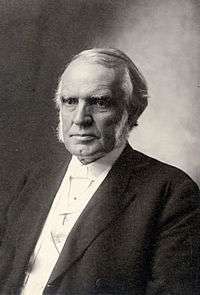Charles Cardwell McCabe

Charles Cardwell McCabe (October 11, 1836 – December 19, 1906) was an American who distinguished himself as a Methodist pastor, an Army chaplain during the American Civil War, a Church executive chiefly in the field of fundraising, as Chancellor of American University, and as a Bishop of the Methodist Episcopal Church (M.E.), elected in 1896.
Birth and Family
Charles was born October 11, 1836 in Athens, Ohio on the same day as Bishop Isaac Wilson Joyce, another Ohio-born M.E. Bishop. Charles was the son of Robert McCabe, a tailor, and Sarah Robinson. His grandfather was also Robert McCabe, who was an early Methodist Class-Leader and an adviser to John Stewart, pioneer of American Methodist missions. Ancestor Owen McCabe was of Covenanter stock from County Tyrone, Ireland. He immigrated to America in the 1740s and by 1750 was located in Sherman’s Valley of Cumberland County, Pennsylvania, in an area that eventually (1820) became Tyrone Township of Perry County, Pennsylvania. Charles went to the altar at eight years of age under the pleading of "Saint" Minturn. He was appointed to lead a class at the age of only fifteen.
Education
In 1854 Charles enrolled at Ohio Wesleyan University, where his uncle, Lorenzo Dow McCabe was a distinguished professor. Although Charles withdrew from school in 1858, he graduated with a B.A. degree in 1860 and was accorded on honorary M.A. in 1864. He then became a High School Principal.
Ordained Ministry
McCabe joined the Ohio Annual Conference of the M.E. Church in 1860. He was ordained Deacon by Bishop Matthew Simpson, September 23, 1860 in Gallipolis, Ohio, and Elder by Bishop Thomas Asbury Morris, September 7, 1862 in Zanesville, Ohio.
Chaplaincy
As the Civil War broke out, McCabe helped raise a regiment of infantry for the Union Army. By October 8, 1862 McCabe was serving as chaplain of the 122nd Ohio Infantry. He was captured by the Confederate Army and sent to Libby Prison, where he served as a chaplain to his fellow prisoners-of-war. During his time as a prisoner of war, McCabe taught "The Battle Hymn of the Republic" to other prisoners to maintain high spirits, and was later invited to the Lincoln White House because of his actions. About his visit to the White House, Jule Ward Howe's daughter Laura Elizabeth Howe Richards wrote: "Among other stirring tales, he told of the scene in Libby Prison; and once more, to a vast audience of loyal people, he sang the Battle Hymn of the Republic. The effect was magical. People sprang to their feet, wept and shouted and sang with all their might; and when the song was ended, above all the tumult was heard the voice of Abraham Lincoln, crying while the tears rolled down his cheeks, 'Sing it again!.'"[1] Ill health later forced him to resign his chaplaincy, January 8, 1864.
Post-War Ministry
Following the war, as the most famous U.S.A. Chaplain, he lectured all over the U.S. on "The Bright Side of Life in Libby Prison." Prior to entering the Episcopacy, he served on the Christian Commission, as a Pastor and as the Church Extension Secretary. He was a missionary promoter, an evangelist and a Gospel singer.
Bishop McCabe also served as Chancellor of American University from December 1902 until his death in December 1906. He was especially prominent in the University's initial fundraising. Indeed, he thought of himself as "doomed to raise money," in such high demand he was as a raiser of funds for churches. Also known as Methodism's "Singing Chaplain," from coast to coast he sang "We're building two a day," a song written in response to the charge that the church was dying out, a charge made by a widely known agnostic of the day, Robert G. Ingersoll.
Death and Burial
Bishop McCabe fell ill in New York City after a fundraising trip to the Methodist Episcopal Church of Torrington, Connecticut. He died in New York Hospital on December 19, 1906, aged 70, and was buried in Rose Hill Cemetery in Chicago.
Selected Writings
- Final Report on Salt Lake City Church, pamphlet, 1880.
- A Glance Backwards, pamphlet, 1886.
- The American University - Taking Our Bearings, pamphlet, 1880.
- Address: The Open Door in Latin Countries, Cleveland, First General Missionary Convention, 1903.
- Shouting, a rich little pamphlet about Christian rapture, n.d.
- Allegory, "Dream of Ingersollville."
- Winnowed Hymns, editor (with D.F. McFarlane).
Biographies
- Sketch: The Battlefield Reviewed, Landon Taylor, 1881.
- Life of Chaplain McCabe, F.M. Bristol, 1908.
See also
References
- ↑ Richards, Laura Elizabeth Howe (1915). "Julia Ward Howe, 1819-1910". Julie Ward Howe. Boston, New York, Houghton Mifflin Co. Retrieved June 8, 2016.
- Leete, Frederick DeLand, Methodist Bishops. Nashville, The Parthenon Press, 1948.
- Methodism: Ohio Area (1812–1962), edited by John M. Versteeg, Litt. D., D.D. (Ohio Area Sesquicentennial Committee, 1962).
| Preceded by John Fletcher Hurst |
Chancellor, American University 1902-1906 |
Succeeded by Franklin E. Hamilton |